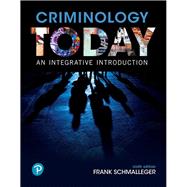For courses in criminology.
A thorough, student-¿friendly introduction to criminology
With a hallmark theme of social problems versus individual responsibility, Criminology Today: An Integrative Introduction prompts students to think critically about the causes of crime and the link between crime theories and policies. Real-life stories and up-to-date issues and examples bring to life both historical and modern criminological approaches. The 9th edition provides more coverage of terrorism and cyberterrorism, including an overview of the many types of terrorist groups and the findings and recommendations of special committees and government bodies.
Criminology Today: An Integrative Introduction , 9 th Edition, is also available via Revel™, an interactive learning environment that enables students to read, practice, and study in one continuous experience.

Criminology Today An Integrative Introduction
by Schmalleger, Frank-

Free Shipping On Orders Over $35
Your order must be $35 or more to qualify for free economy shipping. Marketplace items, eBooks and apparel do not qualify towards the $35 purchase minimum.
-
 We Buy This Book Back!
We Buy This Book Back!
-
 eCampus.com Device Compatibility Matrix
eCampus.com Device Compatibility Matrix
Click the device icon to install or view instructions
Buy Used
Rent Textbook
Buy Courseware
Summary
Author Biography
Frank Schmalleger, PhD, is Professor Emeritus at The University of North Carolina at Pembroke, where he also was recognized as Distinguished Professor. Dr. Schmalleger holds degrees from the University of Notre Dame and The Ohio State University; he earned both a master’s (1970) and a doctorate (1974) in sociology, with a special emphasis in criminology, from The Ohio State University. From 1976 to 1994, he taught criminology and criminal justice courses at The University of North Carolina at Pembroke, and for the last 16 of those years, he chaired the university’s Department of Sociology, Social Work, and Criminal Justice. As an adjunct professor with Webster University in St. Louis, Missouri, Schmalleger helped develop the university’s graduate program in security administration and loss prevention and taught courses in that curriculum for more than a decade. He has also taught in the New School for Social Research’s online graduate program, helping build the world’s first electronic classrooms in support of distance learning through computer telecommunications.
Schmalleger is the author of numerous articles as well as many books: Criminal Justice Today: An Introductory Text for the 21st Century (Pearson, 2016), now in its 14th edition; Juvenile Delinquency, 9th edition (with Clemmens Bartollas; Pearson, 2014); Criminal Justice: A Brief Introduction, 11th edition (Pearson, 2016); Criminal Law Today, 6th edition (Pearson, 2016); Corrections in the Twenty-First Century (with John Smykla; McGraw-Hill, 2015); Crime and the Justice System in America: An Encyclopedia (Greenwood Publishing Group, 1997); Trial of the Century: People of the State of California vs. Orenthal James Simpson (Prentice Hall, 1996); Career Paths: A Guide to Jobs in Federal Law Enforcement (Regents/Prentice Hall, 1994); Computers in Criminal Justice (Wyndham Hall Press, 1991); Criminal Justice Ethics (Greenwood Press, 1991); Finding Criminal Justice in the Library (Wyndham Hall Press, 1991); Ethics in Criminal Justice (Wyndham Hall Press, 1990); A History of Corrections (Foundations Press of Notre Dame, 1983); and The Social Basis of Criminal Justice (University Press of America, 1981). He is also the founding editor of the journal Criminal Justice Studies (formerly The Justice Professional).
Schmalleger’s philosophy of both teaching and writing can be summed up in these words: “In order to communicate knowledge we must first catch, then hold, a person’s interest — be it student, colleague, or policymaker. Our writing, our speaking, and our teaching must be relevant to the problems facing people today, and they must — in some way — help solve those problems.” Visit Schmalleger’s Amazon author page at: http://amazon.com/author/frankschmalleger. Follow his tweets @schmalleger.
Table of Contents
PART 1: CRIME AND CRIMINOLOGY
1. What Is Criminology—Understanding Crime and Criminals
2. Where Do Theories Come From?—From Idea to Evidence
PART 2: CRIME CAUSATION
3. Classical and Neoclassical Thought—Choice or Consequences
4. Early Biological Perspectives on Criminal Behavior—It’s What We Are
5. Biosocial and Other Contemporary Perspectives—Interaction Is Key
6. Psychological and Psychiatric Foundations of Criminal Behavior—It’s How We Think
PART 3: CRIME CAUSATION REVISITED
7. Social Structure Theories—It’s How We Live
8. Theories of Social Process and Social Development—It’s What We Learn
9. Social Conflict Theories—It’s How We Relate
PART 4: THE CRIME PICTURE
10. Criminal Victimization—It’s Personal
11. Crimes Against Persons—It’s What We Fear
12. Crimes Against Property—It’s What We Lose
13. White-Collar and Organized Crime—Crime As a Job
14. Drug and Sex Crimes—Recreational Offenses
15. Technology and Crime—It’s a Double-Edged Sword
16. Globalization and Terrorism—Our Small World
Epilogue: Future Directions—It’s What’s To Come
An electronic version of this book is available through VitalSource.
This book is viewable on PC, Mac, iPhone, iPad, iPod Touch, and most smartphones.
By purchasing, you will be able to view this book online, as well as download it, for the chosen number of days.
Digital License
You are licensing a digital product for a set duration. Durations are set forth in the product description, with "Lifetime" typically meaning five (5) years of online access and permanent download to a supported device. All licenses are non-transferable.
More details can be found here.
A downloadable version of this book is available through the eCampus Reader or compatible Adobe readers.
Applications are available on iOS, Android, PC, Mac, and Windows Mobile platforms.
Please view the compatibility matrix prior to purchase.

